Drawing on affinities between Eurozine’s publishing activities and the European Cultural Foundation’s Connected Action for the Commons programme, we launch a new focal point exploring the prospects for a commons where cultural and social activists meet with a broader public to create new ways of living together.
Under the aegis of the European Cultural Foundation (ECF), the Connected Action for the Commons programme is run in partnership with cultural hub organizations in Croatia, France, Poland, Moldova, Spain and Sweden. The aim of the programme is to strive for a new understanding of the commons based on cultural practices from across Europe and to support the emergence of a European-wide community that uses the power of culture and creativity to revitalize democracy. Connected Action’s contribution to this Focal Point draws heavily on the 2015 publication Build the City: Perspectives on Commons and Culture (co-published by Krytyka Polityczna and ECF) which rediscovers, reframes and reconsiders previously published historical, artistic, participatory and theoretical perspectives on the subject by a wide variety of authors from different regions and professional backgrounds.
Across Europe, citizens and communities are engaging in new forms of cultural cooperation while developing alternative and participatory democratic practices. This specific act of “commoning” as a collective venture of co-development and co-government of everything held in common is dramatically changing the way we look at our societies. At the same time, the emergence of “the Commons” as an alternative value system is challenging the duopoly of state and market. This new paradigm is based on a belief in societies with greater equality, sustainability and solidarity. Agnieszka Wiśniewska‘s article sets the tone for the rest of the focal point. Received notions of artistic and social practices belonging to separate spheres of society are fading away, writes Wiśniewska, hub coordinator at Krytyka Polityczna (Poland). The commons is where cultural and social activists meet with the broader public and, together, create a genuinely participatory culture.
Clearly, culture can and does play a vital role in many of these movements. Acting as a stimulus for development, new values are being shared and “tested” through cultural practice. Cultural and immaterial goods are being produced and distributed through commons-based approaches and affect different strands of society (social, economic and environmental). Contributors to the focal point are realistic, but not pessimistic, about the raft of major challenges that complicates the creation of the commons today. ECF collaborator and independent researcher Charlie Tims considers some of the most pressing challenges – in combination with landmark efforts to regain control over domestic and international modes of governance, as well as to reclaim resources, public space and housing. Campaigners against the Transatlantic Trade and Investment Partnership (TTIP) object to the entrenchment of the role of corporations in the form of an agreement “effectively giving them a veto on future government policies”, writes Tims. At the same time, both austerity policies and the rise of illiberalism throughout Europe are closing down discussions of alternative approaches. All the while, mega infrastructure projects are eating up public space in many European jurisdictions and speculative property transactions are increasingly denying ordinary people affordable housing; in certain locations, extractivist mining projects profit from weak regulatory frameworks and threaten common environmental resources.
However, concludes Tims, “across Europe there are hundreds of organizations, networks and individuals that are passionate about these issues and campaign for the commons”. Indeed, Katarina Pavić, of the Croatian hub Culture 2 Commons, provides examples of concrete policies for advancing both the decentralization of cultural production and the democratization of culture. These policies enable bottom-up cooperation between the independent cultural sector and domestic and European institutions. With a focus on countries of the former Yugoslavia, and Croatia in particular, Pavic explains how such approaches can and should attract Europe-wide attention.
There again, commoning strategies are often improvised even in the liminal spaces that emerge in the cracks of Fortress Europe, as the urban anthropologist Jayne O. Ifekwunigwe points out. In a text based on her September 2015 talk at the ECF’s annual Idea Camp, Ifekwunigwe observes: “Fortress Europe’s borders remain permeable for the transnational flow of capital, commodities and information, but not people.” Yet in some of the most precarious circumstances, “clandestine migrants without legal citizenship do find community and do create new commoning strategies. At the same time, as (in)visible strangers, they must live and labour in the shadows of informal and exploitative economies”. A new commons must therefore embrace “both the mobile and the settled”, Ifekwunigwe concludes.
From the Eurozine archive: Commoning as both resistance and solidarity
Social scientist and activist Brigitte Kratzwald underlines the allegiance between thinking and creating the commons on the one hand, and resistance on the other. In an article entitled The power to refuse first published in Eurozine partner Wespennest (Austria), Kratzwald writes:
Commons are a form of resistance against self-optimization, self-exploitation, isolation and the culture of competition that now seem inescapable for anyone who wishes to succeed in life. They signify resistance against the omnipresence of commodification and the privileged status of private property, and resistance against the notion of people being reduced to the role of consumers.
The immense efforts being channelled into creating digital commons over the pass two decades are increasingly yielding valuable lessons that can be applied across the board. Highlights from Felix Stalder‘s Digital Solidarity, a book first published by Eurozine partner Mute (UK), put some of these lessons into context. The scholar of digital culture and network theory insists that commons “are always part of larger social systems, which are usually oriented towards market exchanges or state control and thus are often hostile towards commons practices. The simple recognition of the rights of the people to manage a resource as a commons and regulate their own affairs is politically contentious. But without it, the commons remains very vulnerable to expropriation from third parties”. Hence the need to remain wary of “participatory surveillance systems”, argues Stalder. Meanwhile, the architect, researcher and activist Dubravka Sekulic considers the need to readdress urban commons through the lens of the digital commons. In an article first published in Eurozine partner dérive (Austria), Sekulic enumerates the lessons to be drawn from the free software community and its resistance to the enclosure of code.
The first instalment of articles concludes with researcher, writer and curator Pelin Tan examining how artist-run platforms generate unique forms of solidarity, translocal networks and alternative pedagogies. In an article based on her talk at Eurozine’s 2013 conference in Oslo, Tan considers the experience of the Gezi Park resistance and other coterminous interventions as offering the basis for a language which remains faithful to the project of rebuilding a collective consciousness.
Second installment: Ongoing challenges, continuous innovation
A second installment published in May features articles on further challenges to the commons as well as innovative projects that enhance conditions for creating the commons. Poland’s nationalist right-wing government, under the “Law and Justice” party, has expressed a desire to completely transform Polish culture. Ahead of the anticipated assault on the country’s national culture, activist and artist Igor Stokfiszewski of Krytyka Polityczna calls for people’s everyday cultural preferences to be given due consideration. If they are not, the government will only end up further alienating the wider public from the existing and newly proposed cultural institutions that are centrally funded; and undermine the vibrancy and diversity of grassroots cultural activities initiated by informal groups and non-governmental organizations. Stokfiszewski therefore calls for a public campaign to stop Polish culture becoming a waste land.
Vitalie Sprinceana reports from Chisinau, Moldova. A sociologist, philosopher, activist and journalist, Sprinceana is also a member of Oberliht Association, another of the hubs in the Connected Action for the Commons network. He explains how his diverse association of urban activists forge new urban networks amid the clash of ideologies resulting from a Soviet legacy on the one hand, and aggressive privatization on the other. Finally, Ann Marie Utratel reports from Barcelona on the latest developments affecting commons-based social innovation. Following the election of the city’s new mayor Ada Colau in June 2015, Barcelona has reinvented itself amid a hive of social, cultural and political activism. As an international coordinator for the ECF’s Spanish cultural hub Platoniq – Goteo, Utratel is well placed to make insightful participatory observations. Major recent highlights include the city’s hosting in mid-March of the commons collaborative economies event Procomuns, an event explicitly geared toward retrieving the concept of collaborative economies from its co-option by commercial interests.

In collaboration with


No collaborative economy without commons
A report from Barcelona
Following the election of the city’s new mayor Ada Colau in June 2015, Barcelona has reinvented itself amid a hive of social, cultural and political activism. Ann Marie Utratel explains how the city’s transformation resonates with inspired efforts to realign collaborative economies with the commons paradigm.

After 100 days in power, Poland’s nationalist right-wing government expressed its desire to completely transform Polish culture. As the anticipated assault on the country’s national culture gets underway, journalist and activist Igor Stokfiszewski of Krytyka Polityczna considers the threat that this blinkered approach poses to the vibrancy and diversity of grassroots cultural initiatives.


The power to refuse
Commons and resistance
Commons are a form of resistance against self-exploitation, isolation and the reduction of people to consumers, writes Brigitte Kratzwald. But this resistance isn’t about destroying what already exists: it’s about creative production geared to meeting people’s real needs.

Received notions of artistic and social practices belonging to separate spheres of society are fading away, writes Agnieszka Winiewska of Krytyka Polityczna (Poland). The commons is where cultural and social activists meet with the broader public and, together, create a genuinely participatory culture.

When commoning strategies travel
(In)visible cities, clandestine migrations and mobile commons
Commoning strategies are often improvised even in the liminal spaces that emerge in the cracks of Fortress Europe, says urban anthropologist Jayne O. Ifekwunigwe. In a text based on her September 2015 talk at the ECF’s annual Idea Camp, Ifekwunigwe calls for a new commons that embraces both the mobile and the settled.
There are a raft of major challenges that complicate the creation of the commons today. The researcher and writer Charlie Tims considers some of the most pressing of these challenges – in combination with landmark efforts to regain control over domestic and international modes of governance, as well as to reclaim resources, public space and housing. The following text is based on his September 2015 talk at the ECF’s annual Idea Camp.
Bottom-up cooperation between the independent cultural sector and domestic and European institutions can lead to both the decentralization of cultural production and the democratization of culture. So says Katarina Pavi of the Croatian cultural hub organization Culture 2 Commons.
Legal hacking and space
What can urban commons learn from the free software hackers?
There is now a need to readdress urban commons through the lens of the digital commons, writes Dubravka Sekulic. The lessons to be drawn from the free software community and its resistance to the enclosure of code will likely prove particularly valuable where participation and regulation are concerned.
Uncommon knowledge
A transversal dictionary
In a text based on her presentation at Eurozine’s Oslo conference on the making of the public sphere, Pelin Tan explains how artist-run platforms are generating unique forms of solidarity, translocal networks and various types of transversal knowledge and alternative pedagogies. In so doing, Tan makes the case for a language that remains faithful to the project of rebuilding a collective consciousness.
As the culture and the institutions of the Gutenberg Galaxy wane, Felix Stalder looks to commons, assemblies, swarms and weak networks as a basis for remaking society in a more inclusive and diverse way, which expands autonomy and solidarity at the same time.








